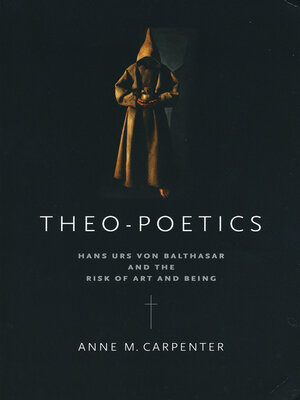
Sign up to save your library
With an OverDrive account, you can save your favorite libraries for at-a-glance information about availability. Find out more about OverDrive accounts.
Find this title in Libby, the library reading app by OverDrive.



Search for a digital library with this title
Title found at these libraries:
| Library Name | Distance |
|---|---|
| Loading... |
Swiss theologian Hans Urs von Balthasar (1905–1988) originated much of twentieth- and twenty-first-century theology's renewed interest in aesthetics. Von Balthasar's theology is both poetic and philosophical, and while this combination is often recognized, it calls for an explanation. In Theo-Poetics: Hans Urs von Balthasar and the Risk of Art and Being, Anne M. Carpenter explores von Balthasar's use of poetry and poetic language, and she offers a detailed analysis of his philosophical presuppositions. Carpenter argues that von Balthasar uses poets and poetic language to make theological arguments because this poetic way of speaking expresses metaphysical truth without reducing one to the other.
Carpenter begins with von Balthasar's very early interests in music, literature, and philosophy, in particular his work, Apocalypse of the German Soul. She explores Glory of the Lord and the trilogy, moving through his despair over the possibility of reconciling art and theology. She uncovers the major characteristics of von Balthasar's metaphysical thinking, discussing his interactions with Thomas Aquinas, Karl Barth, and Martin Heidegger to firmly link Christology, metaphysics, and the expressiveness of language. The book concludes by marshaling its themes into a focused evaluation of von Balthasar's "redeemed" theo-poetic as it comes to expression in the poetry of G. M. Hopkins. Carpenter resituates and reevaluates Hopkins's poetry in a new context, placing him in the school of Aquinas rather than Scotus, and shows us how metaphysics is necessary for a vigorous understanding of language.







